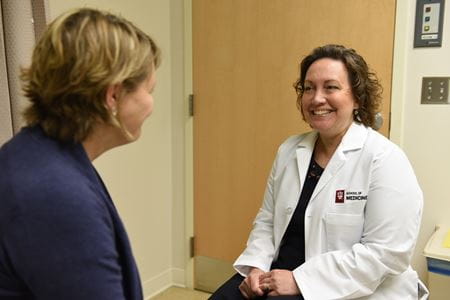Kathy Miller, MD, doesn’t just care for patients in the clinic. The physician-scientist also designs clinical trials to improve the quality and length of patients’ lives. One of the country’s leading breast clinical trial specialists, Dr. Miller, the Ballvé-Lantero Professor of Oncology at IU School of Medicine and the associate director of clinical research at the IU Simon Cancer Center, is co-chair of the National Cancer Institute’s Breast Cancer Steering Committee where she oversees clinical trials nationally. A member of the Vera Bradley Foundation Center for Breast Cancer Research, Dr. Miller shared her expertise about clinical trials.
What is a cancer clinical trial or clinical study?
Clinical trials test new treatment options. We want to ensure the safety of patient who participate in trials, so each new treatment is studied in phases. The first phase, called phase I, studies the safety of a new treatment. Phase I studies enroll only a small number of patients and follow patients closely. Once we know a treatment is safe and understand the dose and schedule, we move to phase II. Phase II trials evaluate how well a treatment works in certain patients. For example, there may be a phase II trial in patients with previously treated lung cancer and a separate phase II trial in patients with kidney cancer. The final step, phase III, compares the new treatment to the best currently available treatment.
Why are clinical trials important and why is it important that people from all ethnic groups participate?
Put most simply, without clinical trials we would have no new cancer therapies. No more clinical trials means accepting that the best we have to offer patients now will be the best we will ever have to offer. Laboratory and animal studies can only teach us so much and take us so far. Lots of treatments that looked promising in the lab didn’t work when tested in people. Some drugs may be metabolized differently or have different side effects based on a patient’s racial or ethnic background. If we don’t have a diverse population in the trials, we won’t recognize and understand those differences.
Who conducts clinical trials?
Clinical trials are conducted by academic cancer centers such as the IU Simon Cancer Center. Some large trials may be open at hundreds of centers around the country or the world, while some smaller trials may only be available at one or two centers. Some trials are sponsored by the National Institutes of Health (NIH), while some are supported by pharmaceutical companies.
Because your expertise is in breast cancer, what can you tell us about breast cancer clinical trials at IU?
My IU School of Medicine colleagues at the IU Simon Cancer Center conduct clinical trials across the spectrum of breast cancer – including risk and prevention, early diagnosis, and the treatment of advanced disease. A few examples, IU School of Medicine is one of 120 sites around the country conducting the TMIST trial. TMIST directly compares standard mammograms to tomosynthesis, often called 3D mammograms, in women at average risk. TMIST will enroll more than 165,000 patients and will define optimal screening for most women. In advanced disease, IU is the only site studying a two-drug combination for patients with metastatic triple negative breast cancer. Based on laboratory work at IU School of Medicine, the combination inhibits two pathways that function together to make cancers resistant to therapy.
How can I find out which clinical trials are available and enrolling patients?
Patients interested in clinical trials at the IU Simon Cancer Center can check online at www.cancer.iu.edu/trials. Clinical trials are also available through Hoosier Cancer Research Network, the community clinical research arm of the IU Simon Cancer Center. The National Institutes of Health is a good resource, too.
If I participate in a trial, will I be told of the trial’s results?
In most cases, yes. It is important to remember that the results of some trials may not be available for several years or more. This is especially true of trials testing new treatments to prevent recurrence in patients with early stage disease.
Will I be told if the treatment is working for me?
Absolutely! We all want and need to know if a treatment is working for you. Patients enrolled in clinical trials are followed closely to make sure their disease is improving or remaining under control and to avoid potentially dangerous side effects.
Do I pay to take part in a clinical trial?
In general, no. Treatments or evaluations that would be part of your treatment, even if you were not enrolled in the trial, are charged to you or your insurance company. However, any treatment or test that is required by the clinical trial is free to the patient. We will explain what is provided and covered by the trial as part of the informed consent process.
